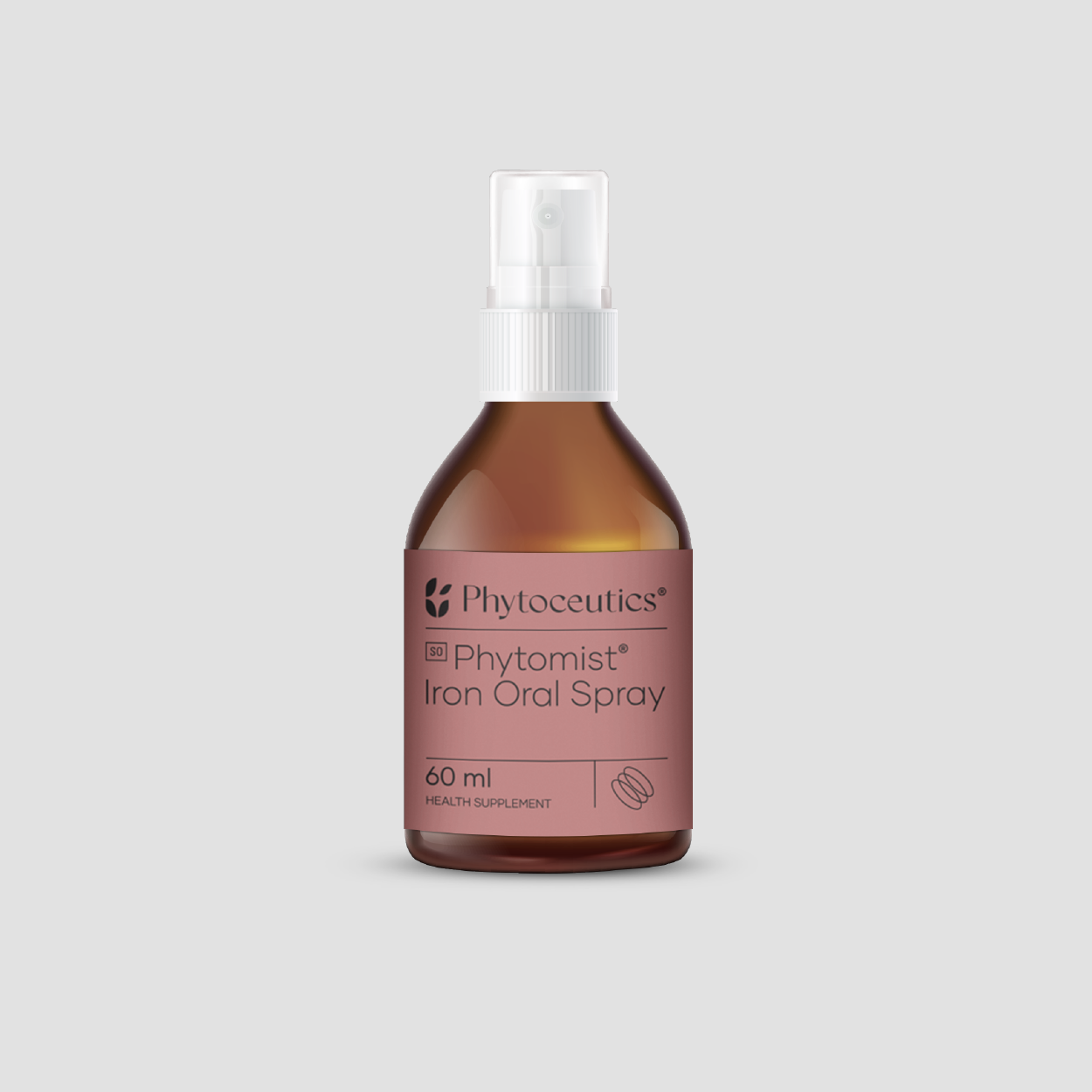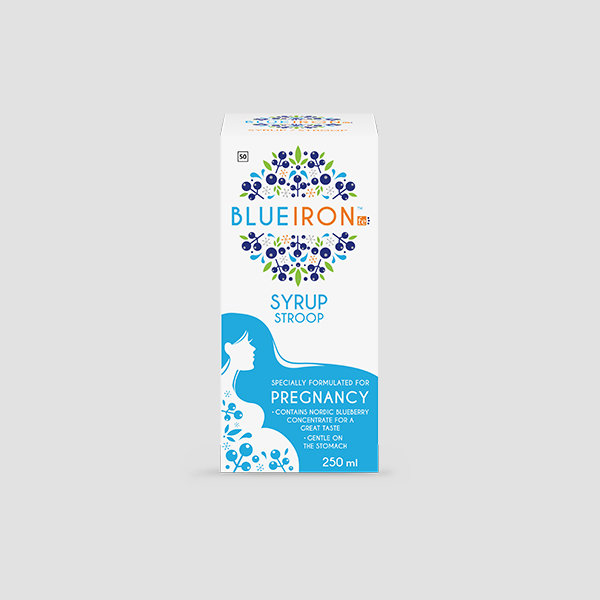Pregnant women, along with growing infants, are among the groups most vulnerable to iron deficiency due to their elevated physiological demands. During pregnancy, the body needs more iron to support the growth of the foetus and placenta, and to expand the mother’s blood volume [1].
The Role of Iron in the Body
Iron is a vital mineral that performs several key physiological functions, with its most recognised role being in the formation of haemoglobin. Haemoglobin enables red blood cells to transport oxygen from the lungs to tissues and organs throughout the body. Without adequate iron, haemoglobin synthesis is impaired, leading to a reduced capacity for oxygen transport – a condition known as iron deficiency anaemia.
Beyond its role in oxygen delivery, iron is also essential for numerous enzymatic processes that drive cellular energy production. Iron-dependent enzymes, such as cytochromes and peroxidases, are involved in metabolic pathways within mitochondria – the energy-producing powerhouses of cells. These enzymes help convert nutrients into usable energy, supporting the increased metabolic demands of pregnancy. A deficiency in iron, therefore, not only limits oxygen availability but can also impair cellular energy production, potentially affecting both maternal health and foetal development [1], [3].
Understanding Anaemia and Iron Deficiency
Anaemia is diagnosed when haemoglobin levels drop below the standard range for healthy individuals of the same age, sex, and pregnancy stage. While iron deficiency is the most common cause of anaemia, it’s not the only one. Other contributing factors include infections, genetics, and chronic diseases. Iron deficiency itself progresses in three stages:
- Impaired haemoglobin production (iron deficiency without anaemia)
Low serum ferritin indicates depleted iron stores – the first stage. However, low ferritin is considered normal in late pregnancy, making diagnosis challenging. The second stage is characterised by abnormal lab values, such as a low iron-to-TIBC ratio or elevated erythrocyte protoporphyrin, even if haemoglobin levels are still normal. The third and most severe stage is iron deficiency anaemia, which includes both low haemoglobin and additional lab evidence of iron deficiency [1].
Why Pregnant Women Are at Risk
Pregnant women are particularly vulnerable to iron deficiency due to the significant increase in iron demands required to support both maternal and foetal health. As pregnancy progresses, a woman’s blood volume expands by approximately 50%, necessitating a substantial increase in red blood cell production. This expansion requires a greater supply of iron to produce haemoglobin – the oxygen-carrying component of red blood cells. In addition, iron is needed to support the development of the placenta and growing foetus, both of which rely on a consistent and adequate oxygen supply [1], [4].
Despite the availability of iron-rich foods, dietary intake alone often fails to meet the increased demands of pregnancy, especially in the second and third trimesters. Clinical research conducted in industrialised countries has repeatedly demonstrated that pregnant women who receive iron supplements maintain significantly higher haemoglobin concentrations than those who do not. This elevation in haemoglobin is clinically important, as it improves the body’s ability to deliver oxygen to tissues and acts as a protective buffer against the inevitable blood loss during labour and delivery [1].
How Maternal Anaemia Affects the Baby
Maternal anaemia has been linked to poor pregnancy outcomes, including low birth weight, preterm delivery, and increased perinatal mortality. A major study involving over 54,000 pregnancies in Wales found that haemoglobin levels below 10.4 g/dL before 24 weeks of pregnancy increased the risk of these complications. Interestingly, very high haemoglobin levels (>13.2 g/dL) were also linked to poor outcomes, possibly due to conditions like preeclampsia (a pregnancy complication characterised by high blood pressure) [1].
Although iron deficiency is likely a factor, the connection isn’t always straightforward. Socioeconomic status, education level, multiple pregnancies, and infections like malaria may also influence outcomes [1].
Do Babies Inherit Iron Deficiency?
Surprisingly, babies born to iron-deficient mothers usually don’t show significant signs of iron deficiency themselves. Studies using ferritin levels to assess infant iron stores found little to no difference between infants of supplemented and unsupplemented mothers. Haemoglobin levels in newborns were also largely unaffected. Only two studies – both conducted in developing countries – found that infants of anaemic mothers were also anaemic, but even then, the anaemia was much milder than in the mothers [1].
How Common Is Iron Deficiency in Pregnancy?
Data from the National Health and Nutrition Examination Survey II survey in the U.S. suggests that 5–10% of nonpregnant women aged 20–44 have impaired iron status. While data on pregnant women was limited, other research shows that iron needs and the prevalence of deficiency increase dramatically during pregnancy. Globally, an estimated 51% of pregnant women are anaemic, with iron deficiency being the main cause [1].
Compelling evidence from longitudinal studies in Europe shows that dietary iron alone often isn’t enough during pregnancy. Women who didn’t receive iron supplements consistently showed lower haemoglobin levels from around week 24 onward. This suggests that routine supplementation is often necessary to prevent iron deficiency and support a healthy pregnancy [1].
Practical Recommendations
While iron-rich foods such as red meat, seafood, poultry, fortified grains, legumes, nuts, and seeds should be part of a healthy prenatal diet, food sources alone may not be sufficient to meet the elevated iron demands of pregnancy. Dr Mostert, an obstetrician-gynaecologist, explains that despite best efforts to consume these foods, many pregnant women may still struggle to reach the required iron levels. “While consuming iron-rich foods is important during pregnancy, it can be challenging to meet the increased iron requirements through diet alone,” she says, “especially for women who have preexisting iron deficiency or difficulty absorbing iron” [2].
To help bridge this nutritional gap, most prenatal multivitamins include iron alongside other critical nutrients for maternal and foetal development. However, the appropriate iron dosage can vary depending on individual factors such as current iron status, diet, and medical history. Women who are pregnant – or planning to conceive – are strongly advised to consult with a healthcare professional to assess their needs and choose the right supplement strategy. “Planning your pregnancy has many benefits,” Dr Mostert notes. For example, women with heavy menstrual periods are more likely to enter pregnancy with depleted iron stores. “Oral iron supplementation before pregnancy is a good idea,” she advises [2].
Routine blood tests during pregnancy can help monitor iron levels, but it’s equally important to be aware of common symptoms of deficiency. These may include persistent fatigue, dizziness, poor concentration, irritability, and sleep disturbances. If any of these symptoms are present, they should be discussed with a healthcare provider promptly. Early diagnosis and appropriate supplementation can prevent complications for both mother and baby.
Looking for an easy way to support your iron levels without the gut discomfort or side effects? Phytoceutics® Phytomist® Iron Oral Spray provides micro-encapsulated Lipofer® iron in an easy-to-use, strawberry-flavoured, sugar-free spray and has a high bioavailability and utilisation by the body. Phytomist® Iron Oral Spray is pregnancy-safe and can be used by persons with chronic conditions and 1 year of age and up.
Iron is a crucial nutrient during pregnancy, not just for the mother’s energy and well-being, but also for the healthy development of the baby. While dietary sources of iron are important, they are often not enough to meet the significantly increased demands of pregnancy. Supplementation, guided by healthcare professionals, plays a vital role in preventing iron deficiency and its complications. Whether you’re already pregnant or planning to conceive, checking your iron status and discussing appropriate supplementation with your doctor can make a meaningful difference to your pregnancy journey and your baby’s start to life.
This content is for informational purposes only and does not constitute medical advice. Always consult with your healthcare provider before starting any new supplement, especially if you are pregnant, nursing, have a medical condition, or are taking prescription or chronic medication.




